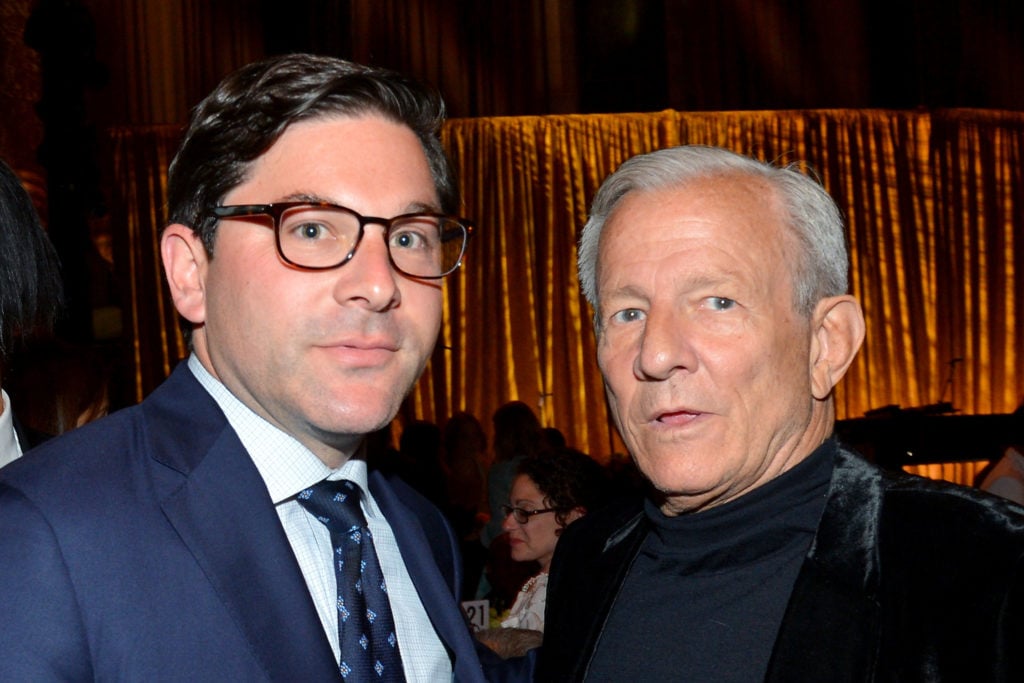Law & Politics
Actor David Spade Sues Photographer Peter Beard for Failure to Authenticate a Work
Spade is trying to sell works that he claims might not be legit.

Spade is trying to sell works that he claims might not be legit.

Eileen Kinsella

In an unusual case that marks the second time in recent years that an artist has been pressured over a failure to authenticate a work, actor David Spade has filed a lawsuit against photographer Peter Beard, his wife Nejma, and former Beard dealer Peter Tunney over a work he purchased 15 years ago and is currently trying to sell.
The suit, alleging negligent misrepresentation, fraudulent inducement, fraudulent concealment, interference with business relations and unfair competition, was filed January 24 in Los Angeles Superior Court.
According to the complaint, in December 2001, Spade purchased four photographic works by Beard from The Time Is Always Now, a New York gallery operated by Tunney. Spade sold two of those works in 2014 “for a considerable profit,” the court papers state.
Spade is now trying to sell one of the remaining works, Untitled (Elephants), which, as his suit states, he believed was “an authentic, completed and signed work by Mr. Beard that Tunney was authorized by Mr. Beard to sell.”
“This case is yet another example of a disturbing trend of collectors resorting to litigation to try to force artists and their representatives to authenticate pieces for their own financial gain,” Judd Grossman, the attorney for the Beards, told artnet News via email. “Courts have consistently rejected these efforts, and we are confident the court will do the same here.”
The authenticity of the piece is now “uncertain,” the claim alleges, as it “may not have been completed or signed by Mr. Beard and may have been sold to Plaintiff without Mr. Beard’s knowledge or consent.” Spade says he believes that at the time he bought the work, Tunney and the Beards were engaged in a dispute as to Tunney’s authority to sell Beard’s works, including Untitled (Elephants).
The claim cites other Beard-related disputes that have arisen over matters including incomplete works, works that were not signed by Beard, and works sold without authorization.

Judd Grossman and Peter Beard in 2016. ©Patrick McMullan.
Spade communicated with some Los Angeles galleries (they are not named in the complaint) regarding a possible sale and learned of potential problems, and says he’s been unable to wring any more information out of the Beards. “To date, neither of the Beards nor Beard Studio has provided definitive statements regarding the completion or incompletion of the Artwork, or whether the manner in which the Artwork was inscribed by Mr. Beard is sufficient to qualify the Artwork as an authentic, signed work by the artist,” the court papers allege.
The artnet Price Database lists over 900 auction lots for Beard. His current auction high is $662,500, paid for Orphan Cheetah Triptych (1968), which soared past its $200,000 high estimate when it was offered at Christie’s New York in 2012.
Spade alleges that the Beard studio’s methods and criteria for authenticating and evaluating are “uncertain, inconsistent and arbitrary and are deliberately designed to enhance the Beard Studio’s ability to control and limit the sale of artworks … and thereby artificially increase the value” of other works in their control. He further alleges that determinations are made and applied “retroactively.”
Spade alleges that the Beards’ refusal to verify the work’s authenticity is “wilfully intended to disrupt and inhibit” Spade’s ability to sell the work.
artnet News obtained copies of photos of the work that were submitted to the Beard studio in 2014 showing the print with handwriting that was confirmed as Beard’s and which appears to be instructions to assistants about further work on the piece, suggesting the piece is incomplete.
Spade’s attorney declined to comment.